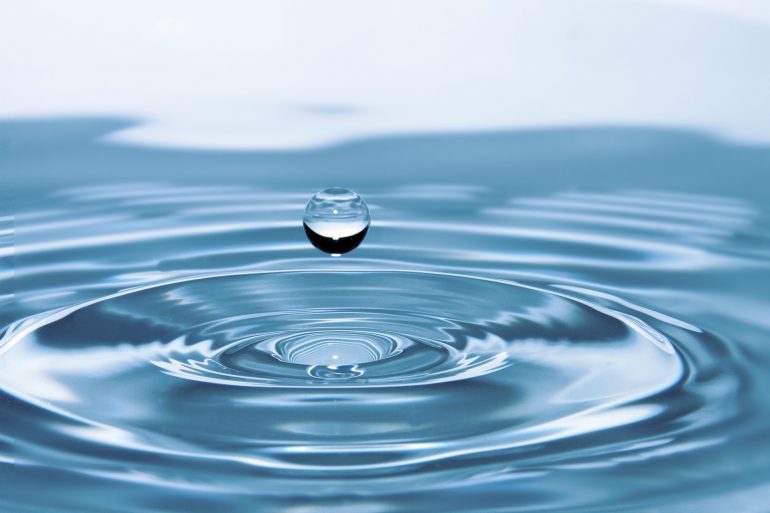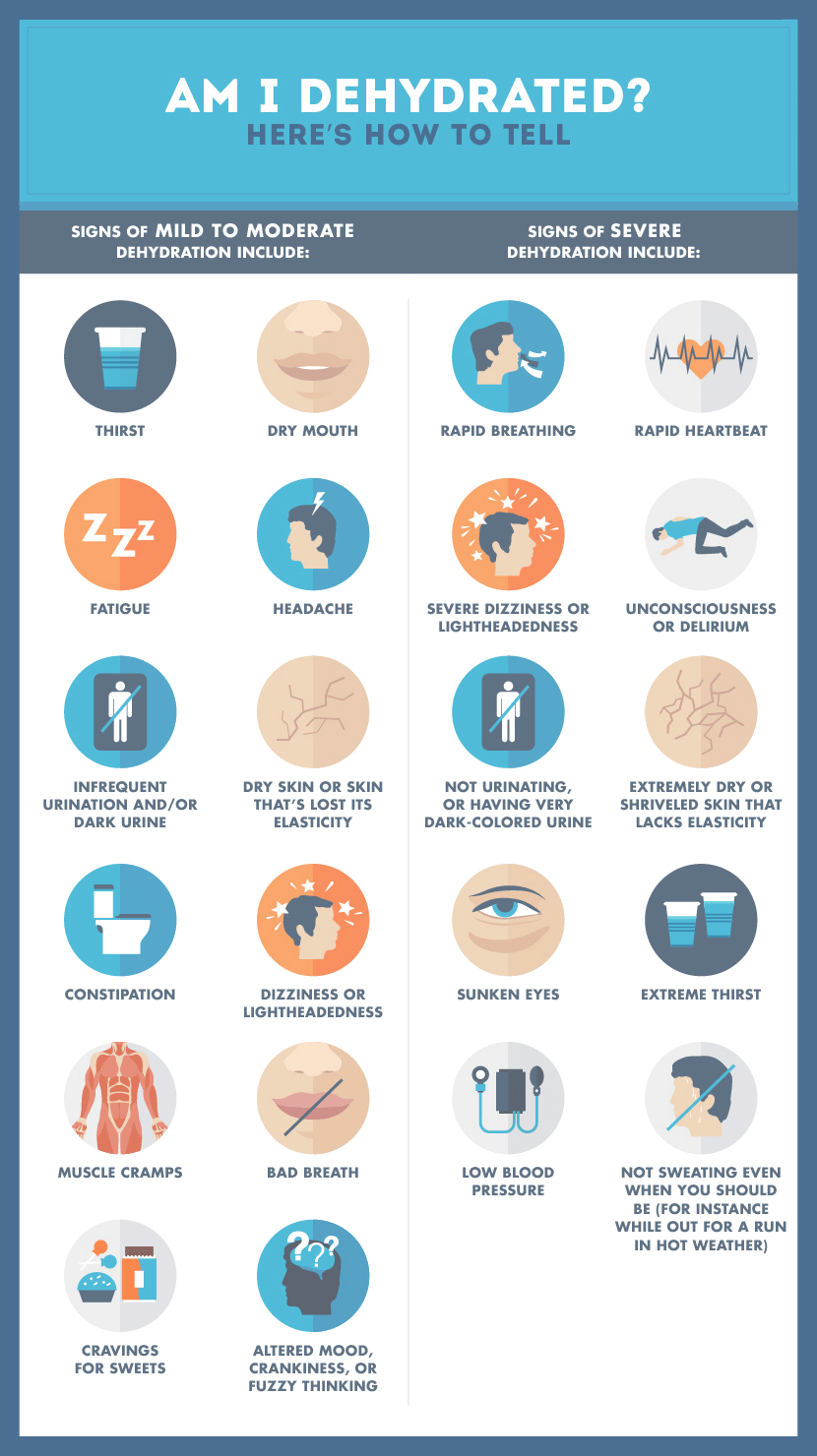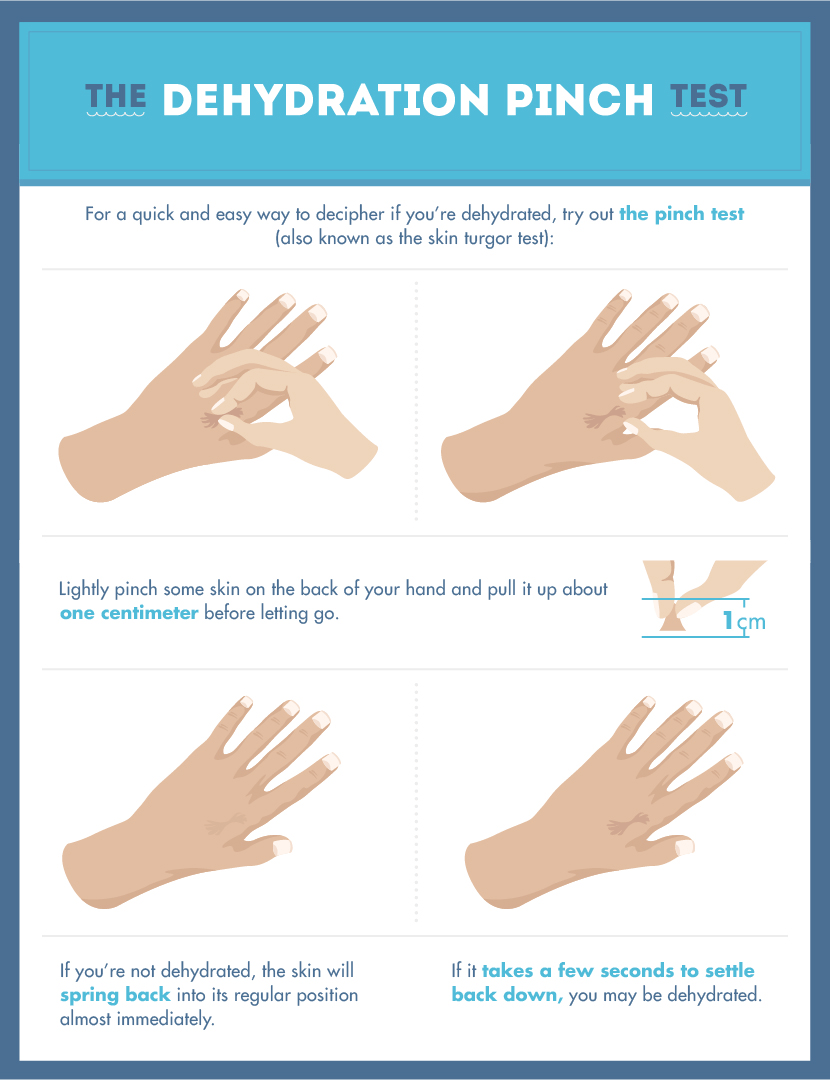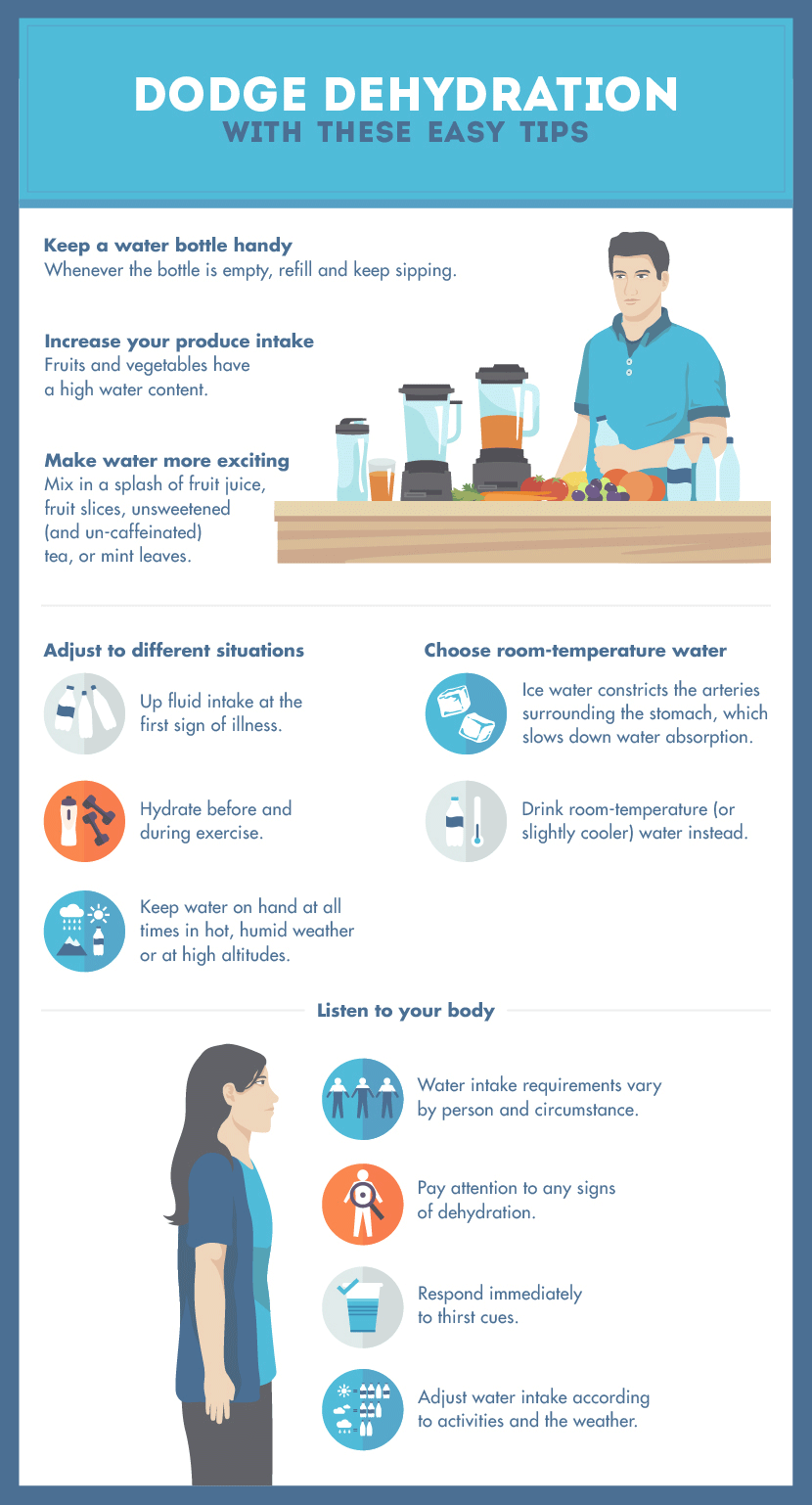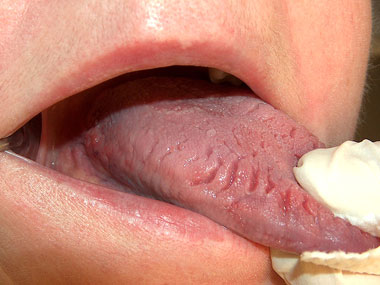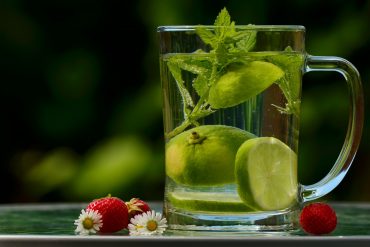None of us would be alive today if it weren’t for water. Our bodies are made up of approximately 60 percent water; many of our internal organs are composed of well over that amount.1 Even our bones are around 30 percent water!2 That’s how integral this element is to our bodies and lives.
Not only does water make up a large percentage of our body weight, but it also helps regulate internal body temperature, metabolize food, flush waste, and lubricate joints. Water allows cells to grow and survive, and carries oxygen throughout our bodies.3
Given all this, it should come as no surprise that when our bodies don’t have enough water, things can go seriously awry. When we don’t have enough fluid, our regulatory systems have to pick and choose which of the functions listed above take priority and compromise on the rest. Depending on the level of dehydration, effects can be mild – say, a faint headache – or severe, such as seizures or coma.
In short, fluid levels are nothing to mess with. Here’s how to identify dehydration’s symptoms and causes, treat it once it starts, and prevent it before it ever has a chance to wreak havoc on your water-loving body.
What Is Dehydration and Why Does It Happen?
Dehydration describes what happens when a person’s body doesn’t have as much fluid as it needs, either because it’s lost too much fluid or the person hasn’t consumed enough fluid, or both.4
Common causes of dehydration include sweating too much, fever, vomiting, diarrhea, frequent urination, and not drinking enough fluids.5
In addition to these common causes, dehydration can stem from other, more surprising sources.6 These include:
- Menstruation, when hormones influence hydration levels
- Prescription medications or dietary supplements, which may act as diuretics
- Low-carb diets
- Pregnancy, when morning sickness may cause women to vomit
- Breastfeeding
- Consuming alcohol, which is a diuretic
- Stress
While anyone can become dehydrated, certain groups – including infants, children, the elderly, people with chronic illnesses, people living at high altitudes, and endurance athletes – tend to be at greater risk.7
Regardless of its cause, dehydration affects the body in some predictable ways. When there’s not enough water in our blood, the hypothalamus gland, which controls fluid balance, gets triggered.8 The hypothalamus then communicates with the kidneys and tells them to withdraw less water from the blood, so we urinate less frequently. At the same time, having inadequate levels of water in the blood causes blood pressure to drop and heart rate to spike.9 As dehydration sets in, cells throughout the body have to work harder in order to carry out basic functions. That causes strain, which can manifest in any number of ways.
How to Tell If You’re Dehydrated
When the body has to work overtime to accommodate dehydration, it lets us know. Signs of mild to moderate dehydration include:10
- Thirst
- Dry mouth
- Fatigue
- Infrequent urination and/or dark urine
- Dry skin or skin that’s lost its elasticity
- Headache
- Constipation
- Dizziness or lightheadedness
- Muscle cramps
- Bad breath11
- Cravings for sweets12
- Altered mood, crankiness, or fuzzy thinking13
Signs of severe dehydration that necessitates medical attention include:14
- Not urinating, or having very dark-colored urine
- Extremely dry or shriveled skin that lacks elasticity
- Severe dizziness or lightheadedness
- Rapid heartbeat
- Rapid breathing
- Sunken eyes
- Unconsciousness or delirium
- Low blood pressure
- Extreme thirst
- Not sweating even when you should be, such as while out for a run in hot weather. This is a sign your body is so dehydrated it has shut down some normal functions.15
While the range of symptoms is very broad, several indicators call for emergency medical attention. Call 911 if a person loses consciousness, demonstrates confusion, has a seizure, has a fever over 102 degrees Fahrenheit, exhibits symptoms of heatstroke (such as rapid breathing or heart rate), or does not start to feel better even after drinking fluids and getting out of the sun.16 If left untreated, severe dehydration can result in permanent brain damage, kidney failure, coma, and even death.17
The good news is that, except in the most severe cases, treating and preventing dehydration is pretty simple. It just takes a little bit of mindfulness and a willingness to check in with your body’s cues.
How to Treat and Prevent Dehydration
If you’re already showing signs of dehydration, then it’s time to go into fix-it mode, stat. Remember, if you or someone else exhibits signs of severe dehydration, it’s important to seek immediate medical attention.
If symptoms are only mild or moderate, your best bet is to drink non-diuretic fluids — ideally water or a sports drink with electrolytes.18 If you have trouble gulping down water, take small sips at regular intervals or suck on ice cubes.19
If dehydration stems from diarrhea, try to drink at least one cup of fluid after every trip to the bathroom.20 It can also be helpful to eat high-potassium foods such as bananas, skinless potatoes, and fruit juices.21 No matter the cause of dehydration, avoid taking salt tablets, which can cause serious health complications.22
Ideally, you’ll never need to treat dehydration because you’ll have prevented it in the first place. The best way to stop dehydration before it ever starts? Consume enough fluids, of course! Here’s how to ensure your daily fluid intake is up to snuff.
- Keep a water bottle handy
It’s easy to get absorbed in work or other activities and forget to walk to the sink for a glass of water. Eliminate the need to break focus by keeping a bottle of water with you at all times. Go easy on the environment by choosing a reusable water bottle. Whenever the bottle is empty, use it as a signal to take a break, stretch your legs, and refill. Then get back to sipping.
- Increase your produce intake
Fruits and vegetables have a high water content and are a great way to up your hydration without needing to use the bathroom every 30 minutes.23 In fact, the foods we eat can provide up to 20 percent of our hydration.24
- Make water more exciting
If you have trouble getting jazzed about drinking lots of water, spruce it up by mixing in some fruit juice, fruit slices, unsweetened and uncaffeinated tea, or mint leaves.25
- Adjust to different situations
Some circumstances require that you consciously increase your water intake – particularly illnesses that include vomiting or diarrhea, intense exercise, or high temperatures and humidity. Up your fluid intake at the first sign of illness, hydrate before and during exercise, and keep water on hand at all times in hot, humid weather or at high altitudes.26
- Choose room-temperature water
Ice water isn’t a great choice because it constricts the arteries surrounding the stomach, which – rather ironically – slows down water absorption.27 Nix the ice and stick to room-temperature or slightly cooler water, instead.
- Listen to your body
The common advice that everyone should drink eight 8-ounce cups of water a day isn’t necessarily an accurate metric. In reality, water intake requirements vary by person and circumstance. For example, someone who’s working at a desk for eight hours has different fluid needs than someone who is training for an ultramarathon.28 The best way to ensure you’re adequately hydrated is to respond immediately to thirst cues, pay attention to whether your body exhibits signs of dehydration, and adjust your water intake according to your activities and the weather.
The Takeaway
No matter who you are, where you live, or what you do on a daily basis, water is integral to keeping you alive and keeping your internal organs and systems healthy and functioning properly. By recognizing the signs of dehydration and (better yet) knowing how to prevent it, you’ll be able to keep your body humming along with all the water it needs.
Reprinted with permission from our friends at Fix.com/blog
 About the author:
About the author:
Laura Newcomer is a writer, editor, and educator with multiple years of experience working in the environmental and personal wellness space. Formerly Senior Editor at the health site Greatist, Laura now lives and works in Pennsylvania. Her writing has been published on Washington Post, TIME Healthland, Greatist, DailyBurn, Lifehacker, and Business Insider, among others. She has taught environmental education to students of all ages in both Pennsylvania and Maine, and prioritizes living an environmentally sustainable lifestyle. She’s a big proponent of creating self-sustaining communities and accessible healthy food systems that care for both people and the earth.
An avid outdoorswoman, she can often be found hiking, kayaking, backpacking, and tending to her garden.
Sources:
- http://water.usgs.gov/edu/propertyyou.html
- http://water.usgs.gov/edu/propertyyou.html
- http://water.usgs.gov/edu/propertyyou.html
- https://www.nlm.nih.gov/medlineplus/ency/article/000982.htm
- https://www.nlm.nih.gov/medlineplus/ency/article/000982.htm
- http://time.com/109129/14-surprising-causes-of-dehydration/
- http://www.mayoclinic.org/diseases-conditions/dehydration/basics/symptoms/con-20030056
- https://www.nlm.nih.gov/medlineplus/ency/article/002380.htm
- http://www.humankinetics.com/excerpts/excerpts/dehydration-and-its-effects-on-performance
- http://www.mayoclinic.org/diseases-conditions/dehydration/basics/symptoms/con-20030056
- http://www.everydayhealth.com/news/unusual-signs-of-dehydration/
- http://www.everydayhealth.com/news/unusual-signs-of-dehydration/
- http://today.uconn.edu/2012/02/even-mild-dehydration-can-alter-mood/
- https://www.nlm.nih.gov/medlineplus/ency/article/000982.htm
- http://www.prevention.com/health/dehydration-and-your-body
- http://www.pennmedicine.org/encyclopedia/em_displayarticle.aspx?gcid=000982&ptid=1
- http://www.mayoclinic.org/diseases-conditions/dehydration/basics/symptoms/con-20030056
- https://www.nlm.nih.gov/medlineplus/ency/article/000982.htm
- https://www.nlm.nih.gov/medlineplus/ency/article/000982.htm
- https://www.nlm.nih.gov/medlineplus/ency/patientinstructions/000121.htm
- https://www.nlm.nih.gov/medlineplus/ency/patientinstructions/000121.htm
- https://www.nlm.nih.gov/medlineplus/ency/article/000982.htm
- http://www.mayoclinic.org/diseases-conditions/dehydration/basics/prevention/con-20030056
- http://www.prevention.com/health/dehydration-and-your-body
- http://www.everydayhealth.com/news/unusual-signs-of-dehydration/
- http://www.mayoclinic.org/diseases-conditions/dehydration/basics/prevention/con-20030056
- http://www.everydayhealth.com/news/unusual-signs-of-dehydration/
- http://www.heart.org/HEARTORG/Conditions/More/MyHeartandStrokeNews/Staying-Hydrated—Staying-Healthy_UCM_441180_Article.jsp

